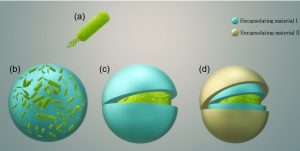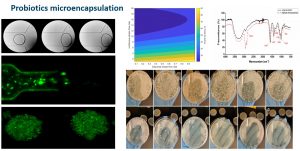Development of a lab-on-a-chip device for the microencapsulation of designer probiotics for biopharmaceutical applications
Background
To successfully deliver probiotics to the consumer, probiotic strains must be manufactured and packaged into consumer products that provide the required dose and shelf life. The manufacturing of high-performance probiotics, therefore, requires a reproducible production process that ensures high yield, quality, and stability. Current manufacturing processes of probiotics for dietary supplements, food, or dairy applications involve freeze-drying which can decrease probiotic cell count and viability dramatically(1). Since the ultimate success of probiotic products depends on their ability to survive the harsh journey through the gastrointestinal tract (low pH of the stomach and high pH of the duodenum) and adhere to the colonic mucosa,

microencapsulation is an effective strategy to prevent degradation of sensitive ingredients such as probiotic bacteria and ensure their timely and targeted delivery into the gut (2). Emerging droplet-based microfluidics technology has the potential to provide high speed, high throughput, stable and uniform microencapsulation of probiotics in a cost-effective and miniaturized closed-system. Microfluidization strategies are already employed for the production of pharmaceutical products, such as liposomes, with high encapsulation efficiency, however, few technologies have been developed for the microencapsulation of probiotics (3,4). Our overall goal is to develop a high throughput droplet-based microencapsulation device capable of generating highly-stable bioactive microcapsules containing probiotic bacteria for biopharmaceutical applications.

Objective
We will develop a controlled-release probiotic production system using on-chip microencapsulation. This microencapsulation platform will be designed and optimized for high throughput production of bioactive alginate microcapsules containing designer probiotic bacteria to improve their long-term viability and shelf- life.
